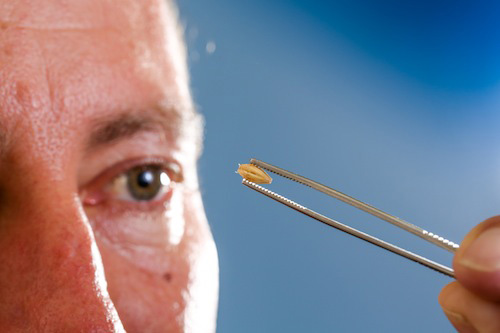Barley program boosts farmer profitability

Professor Jason Eglinton
Researchers at the Waite campus have developed a new barley variety which will increase farm production by 10%. It's the latest in a string of successes over the past 40 years. Developing a new variety of barley takes smart science, high-level expertise - and lots of patience. Researchers at the University of Adelaide's barley breeding program have demonstrated they have an abundance of all three, and growers across Australia are highly grateful. Every year the team at Waite produces new varieties which have special characteristics or are more disease and salt tolerant. And every year over the past decade the centre has managed to deliver farmers productivity gains of between 2-3%. An impressive performance which Barley Program Leader Jason Eglinton says is about to get even better. Growers around the country have recently been testing the University's latest inspiration - a malting barley named Compass which is consistently showing a 10% increase in product yield. "This is one of the most eagerly anticipated product releases from a farmers' perspective in many years," says Associate Professor Eglinton. “It means they'll be able run their barley program for the same costs, with the same management and the same agronomy - and get a 10% improvement in returns. "In terms of productivity growth, this is a very direct and tangible contribution of science to the farming community and industry improvement." Developing a new variety is very much a collaborative effort involving a multidisciplinary team of molecular biologists and biochemists using the latest science. Researchers also work closely with industry, with each potential new variety field tested at 34 different on-farm locations spread across Australia to validate the genetic improvement in real conditions. But to reach this stage takes a huge effort. According to Associate Professor Eglinton the process is like trying to find a needle in a haystack. "We generate about 25,000 potential new varieties every year and test and evaluate every one of them," he says. "But on average we only release about one new variety every 12 months, and a typical product development time is 10-12 years." Last year the University announced a five-year, $10 million investment to expand sections of the program. Royalties earned from new varieties are invested back into research to drive future growth. The breeding group boasts some of the world's major brewing companies among its customers and they are all in it for the long haul. Recently the team released a new variety called Charger which it developed over 10 years in partnership with Carlsberg and Heineken. Charger increases the shelf life of beer by 50% by slowing down an ageing process which results in a stale, papery flavour. This was achieved by switching off a troublesome enzyme called lipoxygenase. Japanese beer giant Sapporo has also partnered with the Waite researchers to develop Southern Star, a variety which improves foam retention. Production starts later this year and the variety will be used exclusively for Sapporo premium brands. Today more than 50% of the barley grown in Australia originated from the Waite laboratories. "We have six or seven other organisations competing in the same space, so it's a track record which we're quite proud of," says Associate Professor Eglinton.
|





